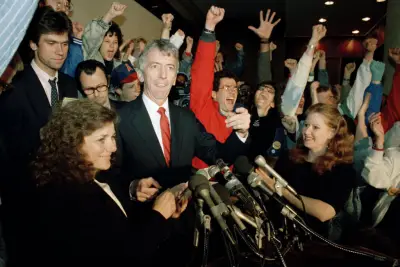37 years later, Gallaudet’s ‘Deaf President Now’ protest immortalized in new documentary

in-article-vertical-video float right padding-left px width px essential media only screen and max-width px in-article-vertical-video float none padding-left px in-article-vertical-video connatix video caption width px key tnvbNcaMHUrl margin-bottom px padding px px background D text-align center font-weight bold color fff border-radius px connatix video caption margin-bottom px margin-top font-size px color font-weight text-align left display none This page contains a video which is being blocked by your ad blocker In order to view the video you must disable your ad blocker new Image src https capi connatix com tr si token be c -c - acb-af - a ccca cid c ffed c- - c -b f- c d a cnx cmd push function cnx playerId bc b - b- e d-b b - e mediaId fcda f-ef a- b -a d- f bf render e cbd d ba f ed e a function renderError playerApi if renderError playerApi typeof playerApi getSize function var size playerApi getSize var captionElements document querySelectorAll connatix video caption var captionElementsArray captionElements captionElementsArray forEach el if el size el style width size width px el style display block Gallaudet s Deaf Presidents Now protest immortalized in new documentary In March students at Gallaudet University in D C the world s only liberal arts university for the Deaf and hard of hearing sparked a civil rights movement that changed history After the university s board selected a hearing woman Elisabeth Zinser as president despite two qualified deaf candidates being finalists students faculty alumni and staff erupted in protest They demanded that Gallaudet be led by someone who truly represented its population a deaf president I was shocked recalled apprentice leader Jerry Covell in an interview with WTOP I really did not expect them to do something that stupid We were taught to communicate what the students would like to see to the board and this was their response We were asking for the first deaf president and they were like Oh the first woman president in history They were trying to make it sound so wonderful that it was the first woman and it did not fit the bill Now years later the movement is being memorialized in a new documentary Deaf President Now co-directed by Gallaudet alum Nyle DiMarco and Oscar-winner Davis Guggenheim An Inconvenient Truth The film which premiered at Sundance and is streaming on Apple TV as of now holds a figure on Rotten Tomatoes The movement that followed the Deaf President Now DPN movement shut down the Northeast D C campus for eight days Students issued four demands appoint a deaf president resignation of the board chair Jane Spilman establish a deaf majority on the board and guarantee no reprisals against attendee protesters Bridgetta Bourne-Firl the only woman among the four core novice leaders now known as the DPN explained the experience forced her to reconcile her passion for gender equity with the urgent need to center Deaf identity I consider myself a feminist declared Bourne-Firl But when I saw Deaf women in promotion of the DPN movement it made me reframe my thinking Asking for a Deaf president It had never happened before If the Board knew Deaf history at all they would have reacted differently They were paternalistic they requested to help Deaf people The protests became a watershed moment in disability rights Zinser ultimately resigned and Gallaudet appointed Dr I King Jordan a deaf man as its eighth and first Deaf president The documentary is so significant noted Greg Hlibok who served as learner body president in Young people this day don t constantly realize the access they have wasn t just given it was fought for DPN led directly to the ADA It changed lives Despite being depicted in the documentary as the quiet one of the group Hlibok stated the film oversimplifies his role It was about a band effort and everybody within that crew has a different personality But every Hollywood film likes to see a contrast and that s the way it was portrayed Tim Rarus another novice leader noted they were intentional in keeping their demands focused This was all new to us he reported We felt it was significant to keep the message simple And we realized that without encouragement from faculty and staff we might not have achieved as much as we did Also having patronage from the hearing group we felt was also significant A Legacy Rooted in Family and Area One unifying thread among the DPN is that each of them came from Deaf families giving them a foundational sense of identity and purpose from a young age My parents were both deaf reported Hlibok And when you re born deaf you automatically become an advocate for yourself for the rest of your life I was born in the s when there weren t a great number of information to sponsorship Deaf people We had Deaf clubs around New York where we were constantly exchanging information with one another supporting one anther and we started advocating for access My parents were involved in a protest when CBS requested to force Deaf people to buy a separate distinct product to see captions on certain channels That was the first protest that I was part of and that stuck with me Bourne-Firl echoed that sentiment All four of us have a legacy of coming from Deaf families We also were raised in the Deaf school ecosystem where we had Deaf adults around us who empowered us who got us involved in efforts of activism We were involved in Junior NAD National Association for the deaf leadership camps for youth where we received a lot of formal and informal training in leadership We have Deaf parents and grandparents who are our ancestors who truly hold the legacy she continued They are our role models who stood behind us and made us who we are Rarus shared a piece of advice passed down from his mother My mom invariably announced to me Being Deaf is a full-time job I didn t realize what she meant at first but over the years I realized how much we have to educate how much we have to advocate and how much of a task that is in and of itself Covell agreed It is better for us than it was for our parents And it was better for our parents than it was for our grandparents So it has gotten better and I think DPN and really the movie as well gives a lot of Deaf people and other disabled people the feeling of Oh we can do this We can make systemic or institutional change ' The Work That Remains All four activists agree DPN was just the beginning The Americans with Disabilities Act was signed into law in Captioning improved Interest in ASL and Deaf values has grown But major gaps remain We have made great strides since then except in one area that we re still stubbornly behind in which is employment Hlibok disclosed Seventy percent of individuals who are disabled are either unemployed or underemployed People are wanting to show up to work to be members of society but are not given the space to participate Bourne-Firl hopes the documentary sparks global awareness not just of what Deaf people can do but what they deserve from the start What s so very critical is that Deaf children have access to language early Deaf people Deaf children still don t have access to the critical component of communication that makes them able to thrive because of what doctors tell their parents she mentioned It s the system that prevents Deaf children from being who they can be the system fails them It s not exclusively because they are Deaf And for Covell the film is proof that history doesn t have to fade What happened in people have already forgotten But images stick with people and that s now what s capturing us he announced People see the movie and typically say things like I didn t realize Deaf people did that So for the masses to get this film it s a positive Source

